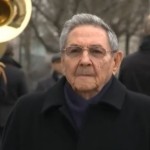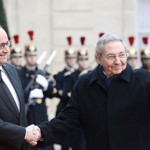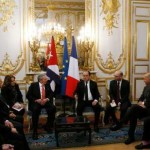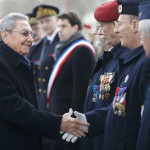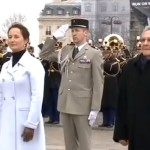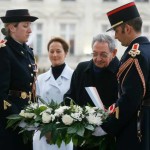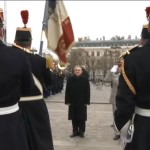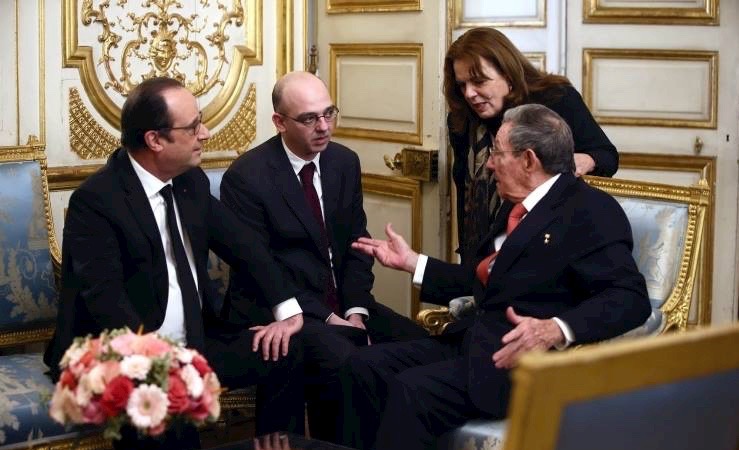
France is ‘resolutely’ on Cuba’s side in demanding an end to the blockade
PARIS, Feb. 1, 2016 — François Hollande on Monday offered frank and massive support for the lifting of the U.S. trade embargo against Cuba, as he stood beside President Raúl Castro, in Paris for the first visit by a Cuban leader to the French capital since his brother Fidel in 1995.
“President Obama, who has made that progress, must — and he said so himself — follow through and permit the termination of this vestige of the Cold War,” the French president said at the Elysée Palace.
“This embargo, this blockade must be erased now that Cuba fully takes its place, and it is the will of this country, it is the will of the international community,” he added to the obvious satisfaction of its guest.
Cuba “appreciates France’s position in favor of lifting the American economic blockade”, Castro responded.
In mid-January, Barack Obama called again on the U.S. Congress to lift the embargo against Cuba, one year after the start of a historic diplomatic normalization between the two former Cold War foes.
The embargo forbids Americans to invest and travel as tourists to the island. Washington also threatens to impose heavy fines against companies in the United States that dare to do business with Havana.
Hollande also announced an additional gesture by France with regard to Cuba after the conclusion on Dec. 12 of an agreement on the Cuban debt owed to Paris Club creditors that erased $8.5 billion in accrued interests.
Paris, he said, will “gradually annul the interests as Cuba repays the arrears.” As part of a conversion of French claims against Cuba, “a French-Cuban fund of over 200 million euros” will be created “to speed up French investment projects in Cuba.”
As expected, President Hollande had little to say on the issue of respect for human rights in Cuba, often criticized by non-government institutions, stating simply, “We have not omitted any subject, either political or economical, including the rights of people.”
France, he added, “is always committed to [human rights observance] and raises the issue at every moment, in all circumstances and for all nations.”
In a symbolic gesture, the president welcomed Raúl Castro with a warm embrace on the red carpet of the Elysée, at the foot of the steps, as a way of consecrating the normalization of relations.
“Today we are opening a new page of history between France and Cuba, and beyond, between Europe and Cuba, and tomorrow between the world and Cuba,” he told the media.
The reception for Castro at the Elysée was to extend into the evening with a state dinner. Seated at the head table, besides the Cuban leader, were Jean-Pierre Bel, former president (Socialist Party) of the Senate and Hollande’s personal envoy to Latin America and the Caribbean; Maryse Wolinski, widow of one of the cartoonists killed in the attack against the magazine Charlie Hebdo; the filmmaker Costa Gavras; the opera singer Barbara Hendricks; and disc jockey David Guetta.
Jean-Luc Mélenchon, leader of the left and a politician never short of criticism against President Holland, was also among the dinner guests. On the menu: coquille Saint-Jacques, perch, and desserts.
Castro was officially welcomed in the morning under the Arc de Triomphe, at the top of the Champs-Elysées bedecked with French and Cuban flags, before riding down the world’s most famous boulevard escorted by the Republican Guard on horseback.
During this visit, France intends to strengthen the presence of its business in a country that is gradually opening up to the market economy. Besides the agreement on the debt and the drafting of an economic roadmap, joint declarations were signed on tourism, fair trade and rail transportation.
Paris sees in Havana a “key element” in a revival of its relationship with Latin America. As a distant echo of the historic trip of General de Gaulle in 1964, Hollande will conduct in late February a Latin American tour that will take him to Peru, Argentina and Uruguay.
[From the French newspaper L’Express; translated by Progreso Weekly.]

